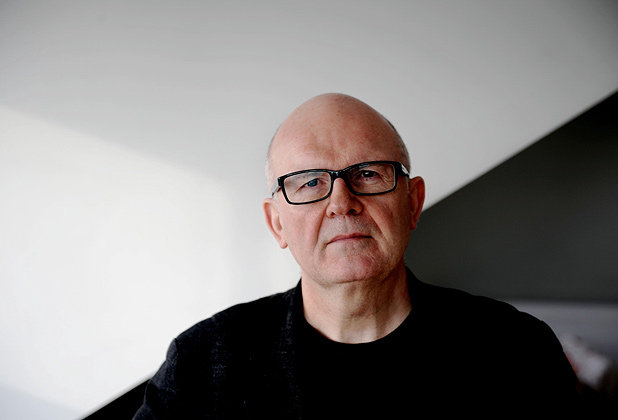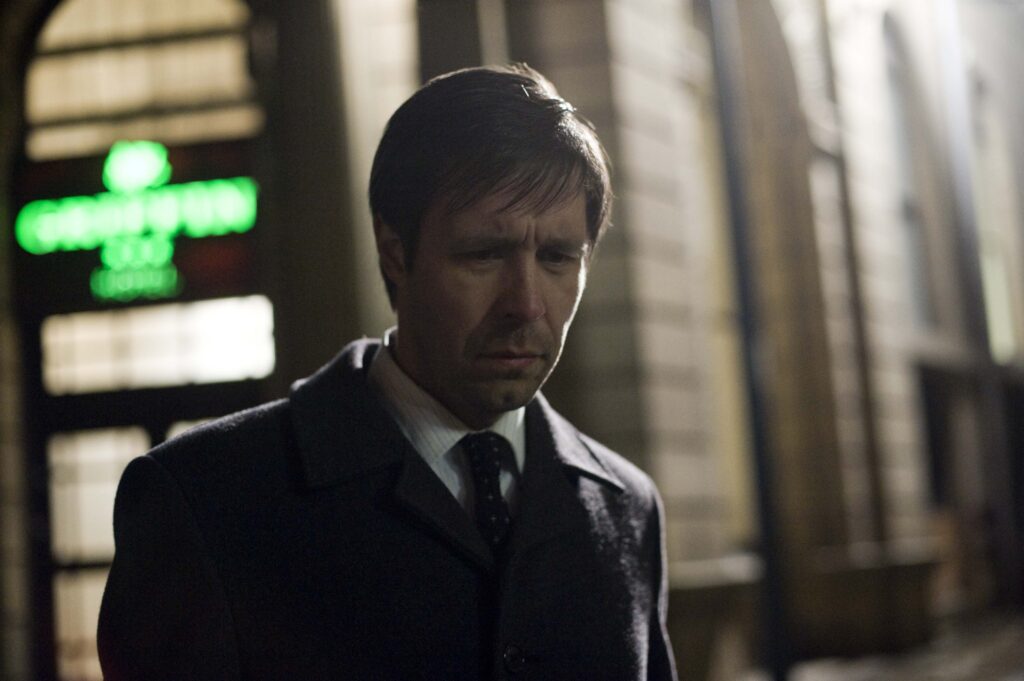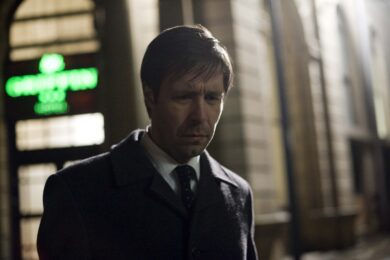“Each day in the mirror I watch death at work…” – Jean Cocteau
Reading the Guardian’s recent Celebrated Writers Who Died in the Past Decade article, I searched again and again for one name: Gordon Burn, who died aged 61 from cancer in 2009. A glaring omission from a newspaper he occasionally contributed to, he seemed to have passed on unnoticed.
This was not the case for the subjects of his two stunning non-fiction masterpieces, Somebody’s Husband, Somebody’s Son, and Happy Like Murderer’s, however. These books force the reader to examine England as a midden of crippling history through the infamously ugly lives of Peter Sutcliffe (in the former) and Fred and Rose West (in the latter).
Influenced by the sophisticated simplicity of Norman Mailer’s ‘true crime’ epic The Executioner’s Song, Burn spent three years living in Sutcliffe’s hometown of Bingley, researching the story of a man who murdered thirteen women and haunted the North of England throughout the 70s like some (all too real) fairytale giant.
Published in 1984 – the year of Live Aid, heavy recession in America and the insidious rise of Apple Mac (a year not too dissimilar to the one we’re failing to define now) – you can only imagine its power upon first reading. We’re talking a good few years before ‘true crime’ had successfully entered the lexicon of British literature; back then it was seen as a cheap, sensationalist sub-genre read exclusively by bizarre housewives or male loners with suspect odours (some may say it still is).
In Burn’s dependably insightful hands, the form was elevated. Throughout, he never flinches; neither does he wallow. His sentences are neat and informative. He understands the weight of keeping it simple, of racking up the facts. But then there’s another voice that infects the page. Norman Mailer described it as follows: ‘It’s as if Thomas Hardy were also present at the writing of this account of the Yorkshire Ripper.’ By that he means the rot had already set in. As with Hardy’s Victorian novels of inherent doom and stagnation, it’s as if it was meant to happen: Sutcliffe as some kind of (un)natural result of a multitude of menacing factors: the end product. Geared up on animal indifference, he owned the night. The seeds had been sown a long time ago: It was Yorkshire that made me do it.
It happens again in Happy Like Murderers, Burn’s retelling of the Fred and Rose West story. The signs were there much earlier than anticipated, only this time we’re in Gloucester; but once again, the tradition of addiction is at play. Fred, like Our Pete (as his family called him) is every bit the successfully brutal misogynist; every bit the end product of a seedily dysfunctional family brought up thinking backwards is forwards; every bit the fundamentalist thrill-seeker of the lowest order. It was Gloucester that made me do it.
It’s a theme that runs throughout Michael Haneke’s last film The White Ribbon. This time we’re in an eerily stiff village somewhere in pre-First World War Germany; and the rot is starting to run wild. One child looks like a boy with a man’s head. He wears a fierce frown and his eyes bear signs of older guilt. Not long now before he leaves the ambiguous cruelty of the village to become a soldier; before that cold death-stare finds its true calling. It’s the village that made me do it.
A black and white photocopy companion piece to Bernardo Bertolucci’s painterly-fascistic Italian ‘war’ film The Conformist: another film that deals with the inherent rot of bad ideas carried out by sadistically selfish and toweringly unreasonable men, Haneke’s austere instincts would have worked bleak wonders on Burn’s depiction of Sutcliffe and, in particular, Leeds in the 70s. That is if we didn’t already have Red Riding.
Initially released in England as a three-part Channel 4 TV series last year, it has recently been given free reign to play out as a five-hour film in selected cinemas and cable TV across America. Adroitly adapted by screenwriter Tony Grisoni from an excellent quartet (one was dropped for the series) of books by David Peace: another acolyte of Burn’s; the series was largely well-received (not that that means a great deal nowadays, when far too many things come emblazoned with undeserved accolades).
Written in an obsessively terse style, Peace has never quite matched his pet Quartet: 1974, 1977, 1980, 1983, not even in the terrifically volatile Damned UTD, and though he wears his influences quite openly (Derek Raymond, James Ellroy, Burn) the final two parts (‘80 and ‘83) are a thrilling mixture of Dante’s Inferno and forgotten British crime writer Ted Lewis’ Jack Carter Omnibus: all clipped sentences and bullet prose; howling imaginings, street sadness and poetic dankness; gathered ghosts, tired rent-boys, incurably crude coppers on the make; the blank allure of faceless buildings wherein last breaths were once gasped; concrete walkways that shine bleakly with rain; and always the incessant call of memories that evoke lines from John Betjeman’s ‘Five O’Clock Shadow’: ‘This is the time of day which is worse than night.’
Maybe it’s the subject that brings the best out in him. As a kid growing up in Ossett, West Yorkshire in the 70s, he was plagued by the presence of the Ripper. And at times, it’s almost as if he’s trying to write him out of his head: the repetitions build and build, and then, like Francis Bacon confronted by another canvas of distorted modern alienation, he gambles and veers off into odd corners. The effect is devastating.
Here was a time when women were genuinely afraid to step out of their houses when the nights called time; when any man – your Dad included – with a beard would invariably be called in for questioning; when hard questions were being asked of the police. Hard to imagine. Hard to grasp. The case refused to be put to bed. Coppers lost their bottle. Coppers hit the bottle. Coppers started fucking around with the same prostitutes that would later be fucked around with by the Ripper. The North of England was being exposed as an incompetent backwater peopled by loathsome blokes with bad feelings about women. The stigma never really went away. The debt of day and time and place was mounting.
Once again, Peace (and Grisoni) makes it clear that this was meant to be; that it was brewing in this particular neck of the woods for some time; that Sutcliffe and many other blokes (police and local, fat-cat councillors included) around those parts had many dark reasons to remain in the Ripper’s shadow; for urges could be satisfied whilst this nutcase plied his grim trade; lust released; dough gained; that sort of thing.
It’s an astonishing achievement; one worthy of any other crime writer chipping away like the ‘grit in the machine’ as Graham Greene described all great writers. And it’s a testament to Serpents Tail to have had the gumption to publish these daring forays into the arse-end of English culture; because they’re not easy books; even the Ellroy comparisons are stretching it slightly; for Ellroy’s underworld obsessions (The Black Dahlia, LA Corruption) were already very much a part of the American fibre and had been documented many times previously.
Peace’s ‘Faction’ (part-fact/part-fiction), on the other hand, is a natural descendent from Burn’s first work of fiction, Alma Cogan, published in 1991; which re-imagines Britain’s best-selling vocalist of the 1950’s, and re-casts her in ordinarily disturbing afterlife, or alternative ever-life, populated by the likes of John Lennon, Doris Day, Sammy Davis JR and the vile spectre of Ian Brady and Myra Hindley. The question he’s asking is how does it feel to never die? The question is partly-answered in the final pages which form the foundations of Burn’s belief that celebrity equates a death in itself; all ways; and always.
Somewhat unfairly, Peace’s motives were scrutinised following the publication of Damned UTD; where friends and family and ex-players of Brian Clough questioned the verisimilitude of his treatment of Clough’s fraught 44-day tenure as manager of Leeds UTD in 1974; each of the accusers overlooking the simple ‘fact’ that the book was a work of fiction; aside from the use of real names (Clough, Billy Bremner, Don Revie et al), at no stage does the book attempt to be anything other than fiction. It seemed a petty hollow argument; it still does.
Burn’s final book Born Yesterday: The News as a Novel went one step further and presented a cast of contemporary ‘characters’ – the McCann’s, Blair, Brown, Kate Middleton – as obscure fiction; or connected fact; either way, it’s an unforgettable read that eschews obvious categorising; this alone makes it something of an essential oddity in an all-too staid book market.
“For a long time – for much of the last century, in fact, wrote Richard Schickel – social commentators have been decrying the steady erosion of our old sense of community. In this context, the celebrity community, which has about it aspects of the extended family, offers a kind of compensation.” – Born Yesterday: The News as a Novel, Gordon Burn.
With this in mind, and in an age of increasingly unreliable news, you could even make a claim for this being the only way to tell a story; whether we’re talking fact or fiction. And in light (or dark, which ever way you see it) of the recent re-incarceration of Jamie Bulger’s killer Jon Venables, and Peter Sutcliffe’s attempt for ‘reasonable release’, it would seem that the real story of England is a guilty one – a criminal one- that refuses to be put down.
The Red Riding series, itself, came under some mild fire with the age-old accusation of ‘misrepresenting the North’; and, on occasion, the (largely male) characters do act in a forcefully degrading way and the tone can get a little overly hysterical; but, once again, this is the story. We’re not talking hard fact, but hard fiction (with elements of fact). Watch it not as a docu-drama that will eventually explain all the salient details; but as a cruel fairy-tale born from the horror of our recent past. And what America got with The Wire; the great American Novel writ large on the TV screen, week in week out, year after year; we got with Red Riding; only this was but a short, bleak burst that floated from the corner of our living rooms like one of the dirt-flecked angel wings worn by the young corpses in the series. This, The English Malady; our only story.

Burns in print.
Somebody’s Husband, Somebody’s Son(1984)
An astonishingly powerful debut that took the English True Crime tale to another level: Burn’s language is lucid and direct and he immerses you into the destructive world of Sutcliffe with great, masterly ease. Quite possibly, alongside Martin Amis’s ‘Money’, one of the most important British books of the decade.
Pocket Money: Inside the World of Snooker (1986)
Following on from the classic 1985 green baize battle between Dennis Taylor and Steve Davis that was watched by 18.5 million people, Burn spent a year on the road with the likes of Alex Higgins, Jimmy White and Tony Meo, to name but a few of the more colourful characters. The end result is one of the finest sport books out there as well as a cracking piece of alternative history; and you don’t need to be a snooker fan to appreciate it.
Alma Cogan (1991)
Burn’s first ‘Whitbread’- winning novel is a compelling and uneasy trip into the mordant flipside of celebrity; where death and fame intersect in some ghostly parallel here and now. Never a great writer of ‘character’ per se, it’s not quite the book you’d like it to be: the premise is too coldly realistic for it to be a ‘good read’. That said; the horror of the final pages is exceptionally well-realised.
Fullalove (1995)
Just waiting to be made into a downbeat British film, Burn’s second novel is the desolate tale of Norman Miller; burnt-out hack who’s seen just that bit too much to hold it together. A direct influence on David Peace’s Red Riding Quartet, it still suffers from the same cold problems that hampered ‘Alma Cogan’, but the quality of his descriptions and the disparate connections that came so easily to Burn are nothing but revelatory.
Happy Like Murders (1998)
Wearing one of the most sarcastically stylish book covers in recent memory (designed by Damien Hirst), Burn’s second incisive True Crime masterpiece is the terribly distinct story of Fred and Rose West. I get the feeling the relentless nature of the subject, and Burn’s hard dedication to the cause, eventually took a lot out of him. It’s a draining, but seriously compulsive read; and his incisive use of repetition only serves to heighten and reflect the relentless horror of ‘life’ in that house.
On The Way to Work (2001)
Probably as a result of the heavy drudgery of completing the West book, Burn entered a period of relaxed reportage with this series of interviews with artist, Damien Hirst. It’s not his best work, and I think he gave the YBA’s a little more credit than their unsubtle, temporal and, sometimes, childish output deserved. That said, Hirst, is at times, entertaining company.
The North of England Home Service (2003)
I had the privilege of interviewing Burn with the publication of this book. He was great company, explaining that this small tale of light-entertainer Ray Cruddas biding time in his post celebrity life was partly inspired by Beckett’s ‘Waiting for Godot’ and the great English writer David Storey. His weakest novel, it still contains moments of piercing quality: Burn was too good a writer to bore the reader.
Best and Edwards: Football, Fame and Oblivion (2006)
After a brief dip in form and intensity with his previous two books, this is Burn back on familiar territory: the flipside of fame, gone wrong. It’s a magnificent read that is interspersed with some truly wonderful supporting quotes (another Burn speciality – the well-picked quote) from a variety of sources. And the final days of Best, spent staring at crosswords in his local pub in Chelsea are nothing but heart-braking.
Born Yesterday: The News as a Novel (2008)
A fitting culmination for a writer who dealt with both hard fact and hard fiction, this unusual modern treatise on celebrity and news, is hauntingly executed. Featuring a cast of ‘characters’ including Margaret Thatcher, Gordon Brown, Tony Blair, the McCann’s, and the author himself, it finishes with the touchingly mortal words: ‘Bye-bye, everybody. Bye-bye.’; and will in time, I’m sure, be read as a modern classic.
Sex and Violence, Death and Silence (2009)
Spanning nearly thirty-five years this collection of Burn’s ‘Encounters with Art’ is a excellent collection of work: two pieces in particular are some of the finest writing of his very fine career; the first one on Francis Bacon that opens the book somehow manages to be both freshly insightful and genuinely illuminating as it makes a typically-Burn-like connection with his paintings and the TV series Big Brother; and in contemporary painter George Shaw he seemed to have finally found his visual equivalent for all of those brilliantly honed sentences, bleak foray’s and illuminating connections that littered his work.
Austin Collings is one third of Brollywood Productions. They are currently in pre-production with their first feature film, Nocturnes.



